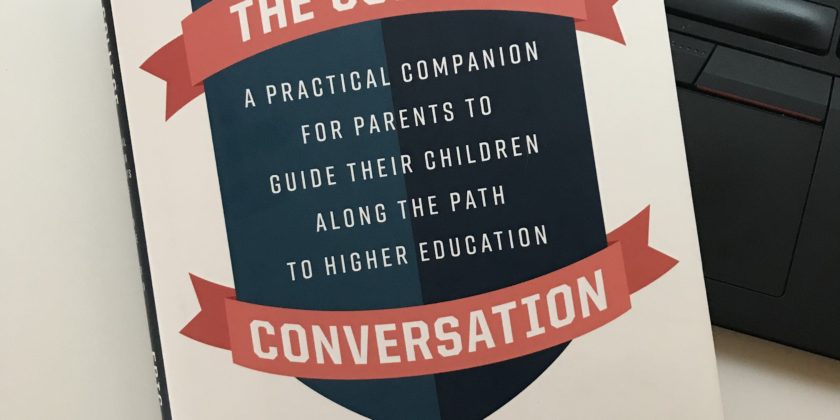Read Rick Clark’s full post on the Georgia Tech admissions blog! In part, here:
—
I’m convinced there are a few messages most parents of high school students need to hear—and hopefully will listen to also.
Pronouns Matter. As your kids enter and move through high school, and especially as they are applying to college, I hope you will be cognizant of your pronouns. If you find yourself commonly saying things like, “We have a 3.8,” Pre-Calc is really killing us this year,” or “Our first choice is ___________,” it may be time to take a long walk, a deep breath, or a stiff drink. Ask yourself if those pronouns are just a reflection of your love and years of intimately intertwined lives, or if they are a subtle prodding to step back and let your student demonstrate what you know they are capable of handling.
As you well know, parenting is a delicate dance that becomes increasingly complicated as kids get older. Be honest with yourself and pay attention to when it’s time to take the lead or step back. Interestingly, it was current Atlanta Mayor (and former Georgia Tech staff member) Andre Dickens who introduced me to the concept of moving from parent to partner with a presentation he used to give at new student-parent orientation. And that should be your focus as your kids move closer toward graduation from high school.
As a parent, I understand this is not easy. But don’t lose sight of the ultimate goal. “College Prep” is not simply about academics, and we should be focused on ensuring our kids are socially, emotionally, and practically prepared, regardless of where they end up going to college. Watching your pronouns is a great place to start.
College admission is not fair. However, in contrast to what most people think, it is easy to understand. Admission is driven by two fundamental rules:
- Supply and demand. The Applicant to Class Size ratio drives admit rates. If applications go up and enrollment does not, the admit rate drops.
This is why you hear about Younger Sibling not getting into University of X (Home of the Fighting X’s) with the same, or even better high school grades and classes, than Older Sibling (a current junior at X with a 3.4 GPA). Three years have passed, U of X’s new first-year class size is the same, but this year they receive 5000 more applications than the year Older applied. Could Younger do the work? 100%. Is Younger talented, ambitious, and very interested in going to University of X? Without question. Is this fair? Nope, but it is logical.
- Mission drives admission. As we just established, Older is a good student and a good person (3.4 GPA in college and very active on campus). But three years ago, when she applied as a high school senior, there was another candidate vying for admission—Applaquint. “App” had better grades, better classes, better writing, and more community involvement (all the things U of X says it values) than Older. App, however, was denied.
Why? Well, it happens that App is from Y (the state just to the east of X). Because University of X is a public school, students from the state are admitted at 5 times (would have been too confusing to say 5x) the rate of non-Xers. Fair? No! Again, App is smarter, nicer, and better looking than Older. But again, totally logical.
College brochures may make all campuses look the same, but the goals for the composition of their classes vary widely in number, geography, major, gender, and so on. So when admission committees discuss candidates, they are reviewing and considering GPA, essays, and letters of recommendation, but ultimately institutional mission and priorities are the lens and filter through which admission decisions are made.
As a parent, my sincere hope is you hear, believe, and prepare yourself for this truth- neither an admit nor deny decision is a value judgment or evaluation of your job as a parent. My friend Pam Ambler from Pace Academy puts it perfectly: “Admission decisions feel deeply personal, but that is not how they are made.” As a result, many parents react when their student receives disappointing admission news. They see that hurt and think they need to call the admission office (or the president or the governor), appeal the decision, “come down there,” or pull strings. After watching this cycle repeat itself over and over, and particularly as my own kids grow up, I’ve come to appreciate ALL of that comes from a place of deep and genuine love. But ultimately, in these moments what kids need from you is very simple—love, concern, empathy, belief, and encouragement, or sometimes just a heartfelt hug.
College Parents > HS Parents. When your kids were little and you were struggling with potty training or getting your baby to sleep through the night, did you seek advice and insight from other parents in the same chapter? No! Because they were either a: just as clueless or frustrated as you were b: maddeningly oblivious c: prone to lie, exaggerate, or hide the reality of their situation.
The same is true when it comes to college admission. Other parents with kids in high school often have just enough information to sound informed but frequently serve to proliferate inaccuracy and consternation– “You know the valedictorian three years ago did not get into….” and “It’s easier to get in from (insert high school three miles away), because they don’t have IB like we do.” Generous generalizations and liberal rounding phrases like, “he has mostly As and Bs” or her SAT is “around a 1400″ should send your BS radar way up in cases like this. Walk away, my friends. Dismiss, change the subject, and don’t let those comments stress you out.
The bottom line is parents of high school students should talk to fewer parents of high school students about college admission, and more parents of current college students, or recent college graduates. These folks, who are one chapter ahead, invariably provide perspective, levity, insight, and sanity. They are far less prone to exaggeration, and in fact often incredibly raw and honest in their evaluation. “She was crushed when she did not get into Stanvard. But now she’s at Reese’s U and is not sorry.” Or “We didn’t get the financial aid package we needed for him to go to Enidreppep University, so he ended up at QSU. He graduates this spring and already has a great job lined up with the company where he’s been interning.” Again, seek perspective, levity, insight, and sanity from parents of current college students, and spend your time talking to parents of other high school students about the upcoming game or recently opened restaurant in your area.
Thanks for reading. Thanks for listening. And stay tuned for upcoming podcasts and blogs with a few more key messages for high school parents coming soon…
If you have friends who not won’t read 200+ pages, but are likely not even ready 1000+ words, you can send them to my original Twitter thread with these messages for parents.









